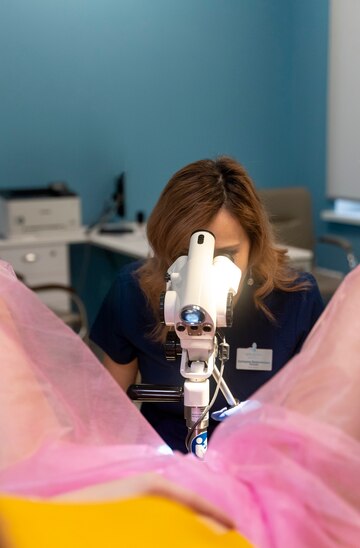+919494994940
drlucaspradeep@gmail.com
HRBR Layout, Kalyan Nagar, Bengaluru

Abnormal Uterine Bleeding (AUB) is characterized by irregular bleeding in terms of volume, duration, or timing. It includes heavy menstrual bleeding, bleeding between periods, prolonged periods, or bleeding after menopause.

Complex endometrial hyperplasia results from excess estrogen without progesterone balance, causing uterine lining overgrowth. It leads to abnormal bleeding and can escalate to endometrial cancer if untreated.

Urinary incontinence refers to the involuntary leakage of urine, while urinary infections involve bacterial growth in the urinary tract. Both conditions can significantly impact quality of life and require appropriate management.

Women with HIV/AIDS face unique challenges including reproductive health issues and treatment adherence. Our clinic provides specialized care to manage ART, reproductive health, and overall well-being effectively.

Adenomyosis is a condition where the inner lining of the uterus (endometrium) breaks through the muscle wall of the uterus (myometrium). This can cause the uterus to become enlarged, painful, and can lead to heavy or prolonged menstrual bleeding.

Cervical dysplasia refers to abnormal cell changes on the cervix, often detected through Pap smear tests. It is typically caused by human papillomavirus (HPV) infection and can vary in severity from mild to severe.

Endometriosis is a chronic condition where tissue similar to the lining inside the uterus (endometrium) grows outside the uterus. This tissue can be found on organs within the pelvic cavity, causing inflammation, pain, and sometimes fertility problems.

Fibroids, also known as uterine leiomyomas, are benign growths that develop within or around the uterus. Their symptoms vary based on size and location, commonly causing heavy menstrual bleeding, pelvic pressure, and discomfort.

Genital warts are one of the most common types of sexually transmitted infections (STIs). They are caused by certain strains of the human papillomavirus (HPV). These warts can affect both men and women and appear on the genital and anal areas.

Tubal blockage, also known as fallopian tube obstruction, is a condition where the fallopian tubes are blocked or damaged, preventing the egg from traveling from the ovary to the uterus. This condition is a significant cause of female infertility.

Irregular menstruation, or irregular periods, refers to variations in the menstrual cycle that deviate from the normal pattern of 21 to 35 days. This condition can involve changes in cycle length, flow intensity, and duration, and can affect women at various stages of their reproductive life.

Abnormal vaginal discharge refers to any significant change in the color, consistency, amount, or smell of vaginal secretions. It can be a symptom of various infections or other health conditions and warrants medical evaluation if persistent or accompanied by other symptoms.

Polycystic Ovary Syndrome (PCOS) is a common hormonal disorder affecting women of reproductive age. It is characterized by irregular menstrual periods, excess androgen levels, and polycystic ovaries.

Menopause is a natural biological process marking the end of a woman's reproductive years, typically occurring between ages 45 and 55. It is defined as the absence of menstrual periods for 12 consecutive months.

Cancer screening tests are medical procedures used to detect cancer in its early stages before symptoms appear. Early detection through screening can significantly improve treatment outcomes and survival rates.

Contraception prevents pregnancy; family planning manages child timing and number. Crucial for reproductive health, enabling desired family size and pregnancy spacing for individuals and couples.

Preconception counseling involves medical advice and planning before pregnancy to optimize health and prepare for a healthy pregnancy. It includes discussions on lifestyle, nutrition, medical conditions, and genetic risks.

Dilation and Curettage (D&C) is a uterine procedure to diagnose and treat conditions like abnormal bleeding or miscarriage by dilating the cervix and scraping the uterine lining.

Medical Termination of Pregnancy (MTP), commonly known as abortion, is the process of ending a pregnancy through medication or surgical procedures to safeguard maternal health or in cases of fetal abnormalities.

Cosmetic gynecology, or Female Cosmetic Genital Surgery (FCGS), refers to elective surgical procedures aimed at enhancing the aesthetic appearance of the female genitalia, addressing issues such as labiaplasty, vaginal rejuvenation, or other aesthetic modifications.

Pregnancy ultrasound, also known as obstetric ultrasound, uses sound waves to create images of the developing fetus in the womb. It helps monitor fetal growth, detect abnormalities, and determine due dates during pregnancy.

Early pregnancy care involves medical monitoring and support during the initial weeks of pregnancy to ensure maternal and fetal health. It includes prenatal visits, screenings, and lifestyle guidance for a healthy pregnancy.

Women's health care checkups involve regular medical exams and screenings tailored to women's health needs. These checkups address reproductive health, breast health, cervical cancer screening, and overall wellness.

Gynecology laparoscopic surgery involves minimally invasive procedures performed through small incisions in the abdomen using a laparoscope. It is used for diagnosing and treating various gynecological conditions such as endometriosis, ovarian cysts, and fibroids.

High-risk pregnancy involves complications endangering mother or fetus, due to factors like maternal age, medical conditions, multiple pregnancies, or pregnancy-related issues such as preeclampsia.

Pregnancy tests detect human chorionic gonadotropin (hCG) hormone levels in urine or blood to confirm pregnancy. They are reliable indicators available as home kits or through healthcare providers.

Fetal assessment involves monitoring the health and development of the fetus during pregnancy. Methods include ultrasound scans, fetal heart rate monitoring, and other tests to ensure fetal well-being and detect any potential complications.

A cervical stitch, or cervical cerclage, is a surgical procedure where a stitch is placed around the cervix during pregnancy to prevent premature opening or dilation. It helps support the cervix and reduce the risk of miscarriage or preterm birth in certain high-risk cases.

Prenatal testing refers to medical tests and screenings performed during pregnancy to assess the health of the fetus and detect any potential abnormalities or conditions. This includes ultrasound scans, genetic screening, and other diagnostic tests to monitor fetal development and maternal health.

Management of multiple pregnancies, including twins or higher-order multiples, entails monitoring fetal growth, addressing preterm labor risks, and ensuring maternal-fetal health through consistent prenatal care and necessary medical interventions.

Genetic counseling involves assessing familial and medical histories to evaluate the risk of genetic disorders or birth defects. It provides information and support to individuals or couples considering pregnancy or dealing with genetic conditions.

Bad Obstetric History refers to a medical history involving recurrent pregnancy losses, stillbirths, or other adverse pregnancy outcomes. It requires thorough evaluation to identify underlying causes and appropriate management for future pregnancies.

Placental problems in pregnancy include placenta previa, placental abruption, and placental insufficiency, affecting fetal development and maternal health, requiring close monitoring and medical management for optimal outcomes.

Preeclampsia is a pregnancy complication characterized by high blood pressure and signs of organ damage, often occurring after 20 weeks. It requires monitoring and, in severe cases, prompt medical intervention to prevent complications.

Family planning involves strategies and methods to help individuals and couples achieve their desired number and timing of children. It includes contraception, fertility awareness, and reproductive health education for informed decision-making.